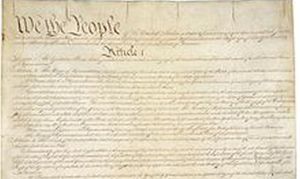It is up to the president to decide how to conduct the country’s most counterproductive and humiliating foreign policy in more than a century.
 Washington, June 9 – In a 6-3 ruling, on Monday the Supreme Court ruled that successive US presidential administrations had acted on a constitutionally sound basis to instruct the State Department not to print “Israel” as the birthplace of US passport holders born in Jerusalem, explaining that the Executive branch has the last word on how to flush good foreign policy down the toilet.
Washington, June 9 – In a 6-3 ruling, on Monday the Supreme Court ruled that successive US presidential administrations had acted on a constitutionally sound basis to instruct the State Department not to print “Israel” as the birthplace of US passport holders born in Jerusalem, explaining that the Executive branch has the last word on how to flush good foreign policy down the toilet.
In their decision, the justices wrote that although Congress has some say in the conduct of foreign affairs, notably in terms of budget allocations, the power to undercut staunch US allies and alienate erstwhile friends is otherwise exclusively the president’s. Thus, said the judges, a 2002 law mandating that “Israel” be printed on the passports of Jerusalem-born US citizens who request it overstepped Congressional authority, and that the Bush and Obama administrations had acted properly in ignoring that provision of a broader piece of legislation, since it is up to the president to decide how to conduct the country’s most counterproductive and humiliating foreign policy in more than a century.
With its ruling the Court cleared the way for the Obama administration to subject its State Department and White House spokespeople to embarrassing press conferences and question-and-answer sessions regarding its policy on Jerusalem, which is completely under Israeli sovereignty and Israel considers its capital. Already, a State Department spokesman has had to reiterate a wishy-washy avoidance of AP correspondent Matt Lee’s simple question as to what the US considers Israel’s capital, and what country it considers Jerusalem to be part of.
The lack of clarity on Jerusalem, which applies even to the western sections Israel secured in its 1948 War of Independence, composes one element of a larger crappy foreign policy that is the Executive branch’s domain. Larger components of the lousy policy include the betrayal of US allies along the Arabian Peninsula by all but allowing Iran to develop nuclear weapons, and the ancillary effect of that betrayal as an increase in the number of countries that will pursue atomic weapons technology as a result. Also contributing to the sewer-worthy policy are Obama’s refusal to do anything about Syran President Basher Assad’s use of chemical weapons in defiance of Obama’s own specific red lines, and his administration’s wimpy response to Russian aggression in Ukraine.
“The Constitution in in Article II has always been interpreted to mean that the president, not the legislature, controls foreign policy,” wrote Justice Anthony Kennedy in the decision. “While the framers may have intended for the president to follow a consistent, or at least constructive, foreign policy is neither here nor there, since the language of the Constitution unequivocally supports presidential authority even under the current circumstances, in which the president would likely achieve better results by personally dunking the heads of all foreign ambassadors in an unflushed White House toilet.”




